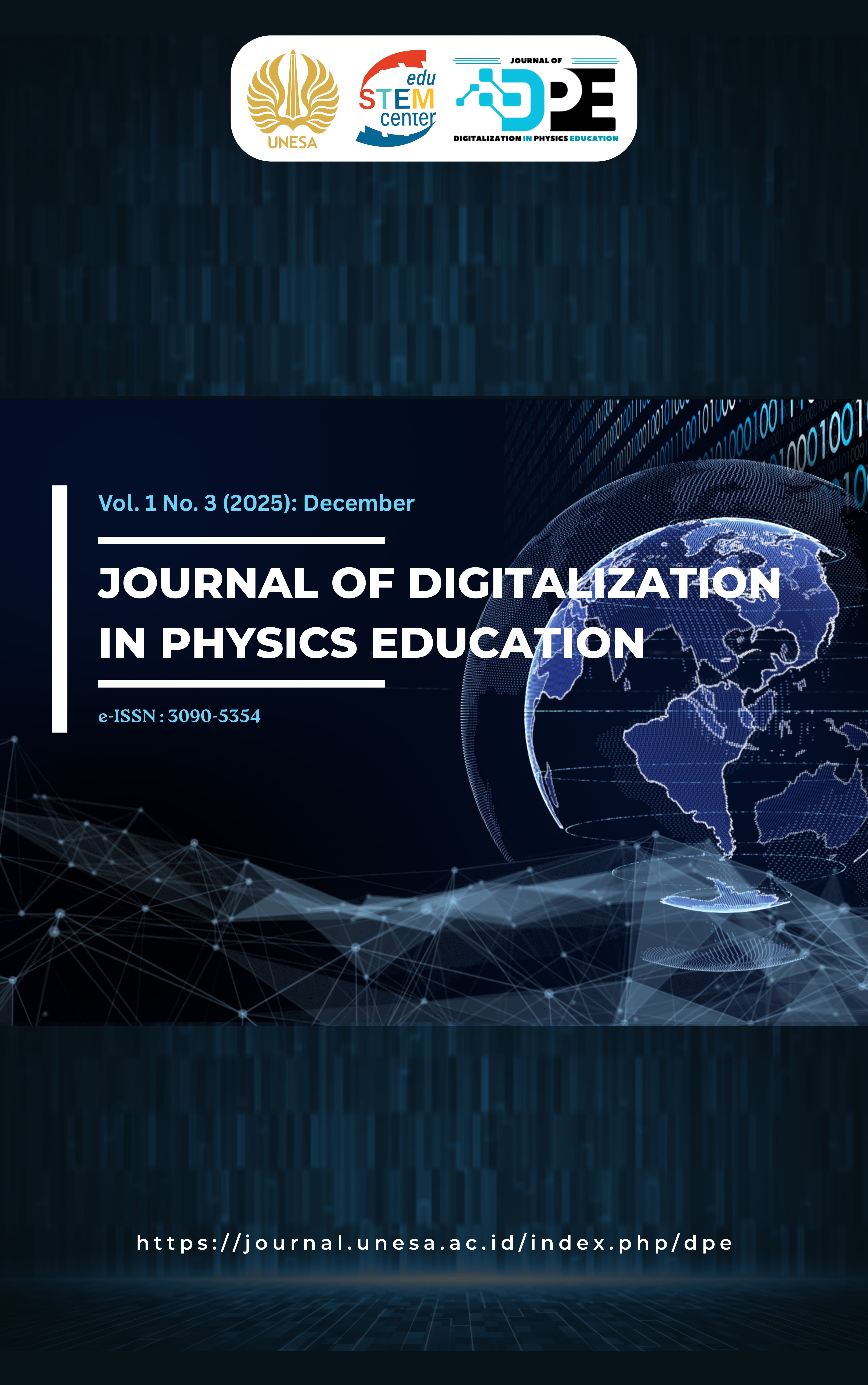The Effectiveness of Black's Principles with Modeling-based Learning (MbL) to Improve Students' Science Process Skills
DOI:
https://doi.org/10.26740/jdpe.v1i3.45185Keywords:
Black's Principles, Modeling-Based Learning, Science Learning, Science Process SkillsAbstract
Objective: This study aims to examine the effectiveness of the Modeling-based Learning (MbL) model in improving students’ science process skills (SPS) on the topic of Black’s Principle. SPS is essential for mastering STEM, yet remains relatively low among Indonesian students, as indicated by PISA and TIMSS results. Method: The research employed a quasi-experimental design using a pretest-posttest control group design. Two high school classes, each consisting of 30 students, participated in the study. The instruments used included an SPS test and questionnaires that measured skills such as observing, formulating hypotheses, conducting experiments, and interpreting and communicating data. Data analysis involved N-Gain calculations, normality tests, and paired t-tests to confirm statistical significance. Results: The findings revealed that the experimental class taught using the MbL model showed a significant improvement in SPS, with an average N-Gain score of 0.8 (high category). In contrast, the control class, which did not receive MbL-based instruction, only reached an average N-Gain score of 0.5 (medium category). Statistical tests confirmed the significance of these differences, demonstrating the positive impact of the MbL model on SPS development. Novelty: This study highlights the potential of the MbL approach as an innovative and effective teaching model to enhance science process skills at the secondary school level. By integrating modeling activities into learning, the MbL strategy provides students with deeper engagement and better mastery of scientific inquiry processes compared to traditional methods.
References
Bao, L. (2020). Unpacking the process of learning gain: Meaningful comparison of pre-post changes across contexts. Physical Review Physics Education Research, 16(1), 010111. https://doi.org/10.1103/PhysRevPhysEducRes.16.010111
Bybee, R. W. (2013). The case for STEM education: Challenges and opportunities. NSTA Press.
Clement, J. (2000). Model-based learning as a key research area for science education. International Journal of Science Education, 22(9), 1041–1053. https://doi.org/10.1080/095006900416901
Daniel, J. (2020). Sampling essentials: Practical guidelines for making sampling choices. SAGE Publications.
Furtak, E. M., Seidel, T., Iverson, H., & Briggs, D. C. (2012). Experimental and quasi-experimental studies of inquiry-based science teaching: A meta-analysis. Review of Educational Research, 82(3), 300–329. https://doi.org/10.3102/0034654312457206
Hadi, S., Prasetyo, Z. K., & Wahyudi, W. (2024). Laboratory practices in Indonesian schools: Between verification and inquiry. Journal of Science Education Research, 35(2), 112–128. https://doi.org/10.1080/00219266.2024.1234567
Hake, R. R. (1999). Analyzing change/gain scores. Unpublished manuscript. Retrieved from http://www.physics.indiana.edu/~sdi/AnalyzingChange-Gain.pdf
Hmelo-Silver, C. E., Duncan, R. G., & Chinn, C. A. (2007). Scaffolding and achievement in problem-based and inquiry learning. Educational Psychologist, 42(2), 99–107. https://doi.org/10.1080/00461520701263368
Kim, J., & Park, H. (2025). Implementation of modeling-based learning in the Korean science curriculum: Effects on students’ science process skills. Journal of Science Education Research, 34(2), 145–160.
Köseoğlu, P., & Mercan, S. I. (2019). Using normalized gain to analyze the effectiveness of instructional interventions in science education. Journal of Baltic Science Education, 18(1), 82–94. https://doi.org/10.33225/jbse/19.18.82
Kuhn, D. (2010). Teaching and learning science as argument. Science Education, 94(5), 810–824. https://doi.org/10.1002/sce.20395
Kurnaz, M. A., & Arslan, A. (2022). The role of science process skills in scientific literacy and everyday reasoning. Research in Science & Technological Education, 40(1), 1–18. https://doi.org/10.1080/02635143.2020.1758632
Lohr, S. L. (2019). Sampling: Design and analysis (2nd ed.). CRC Press.
Louca, L. T., & Zacharia, Z. C. (2012). Modeling-based learning in science education: Cognitive, metacognitive, social, material and epistemological contributions. Educational Review, 64(4), 471–492. https://doi.org/10.1080/00131911.2011.628748
Louca, L. T., Constantinou, C. P., & Tsivitanidou, O. (2023). Model-based learning in science education: A systematic review and research agenda. Science Education, 107(1), 27–56. https://doi.org/10.1002/sce.21761
Mullis, I. V. S., Martin, M. O., Foy, P., Kelly, D. L., & Fishbein, B. (2020). TIMSS 2019 international results in mathematics and science. TIMSS & PIRLS International Study Center.
National Research Council. (2012). A framework for K-12 science education: Practices, crosscutting concepts, and core ideas. The National Academies Press.
OECD. (2019). PISA 2018 results (Volume I): What students know and can do. OECD Publishing. https://doi.org/10.1787/5f07c754-en
Osborne, J. (2014). Teaching scientific practices: Meeting the challenge of change. Journal of Science Teacher Education, 25(2), 177–196. https://doi.org/10.1007/s10972-014-9384-1
Rahmawati, Y., Ridwan, R., & Hadinugrahaningsih, T. (2019). Professional development of science teachers for implementation of inquiry-based learning in Indonesia. Journal of Physics: Conference Series, 1157(2), 022030. https://doi.org/10.1088/1742-6596/1157/2/022030
Schlotter, M., Schwerdt, G., & Woessmann, L. (2021). Econometric methods for causal evaluation of education policies and practices: A non-technical guide. Education Economics, 29(6), 566–584. https://doi.org/10.1080/09645292.2021.1930833
Schwarz, C. V., Reiser, B. J., Davis, E. A., Kenyon, L., Achér, A., Fortus, D., Shwartz, Y., Hug, B., & Krajcik, J. (2009). Developing a learning progression for scientific modeling: Making scientific modeling accessible and meaningful for learners. Journal of Research in Science Teaching, 46(6), 632–654. https://doi.org/10.1002/tea.20311
Suprapto, N. (2020). Indonesian students’ science literacy: A review and analysis of PISA results. Jurnal Pendidikan IPA Indonesia, 9(2), 248–260. https://doi.org/10.15294/jpii.v9i2.24636
Wahyudi, W., Supardi, Z. A. I., & Rahayu, S. (2021). Implementation of laboratory activities in Indonesian schools: Opportunities and challenges for scientific process skills. Journal of Physics: Conference Series, 1747(1), 012011. https://doi.org/10.1088/1742-6596/1747/1/012011
Windschitl, M., Thompson, J., & Braaten, M. (2008). Beyond the scientific method: Model-based inquiry as a new paradigm of preference for school science investigations. Science Education, 92(5), 941–967. https://doi.org/10.1002/sce.20259
Zhang, F., & Linn, M. C. (2022). How can students learn science process skills through modeling-based learning? Evidence from large-scale classroom studies. Science Education, 106(4), 819–845. https://doi.org/10.1002/sce.21721
Downloads
Published
How to Cite
Issue
Section
License
Copyright (c) 2025 Journal of Digitalization in Physics Education

This work is licensed under a Creative Commons Attribution 4.0 International License.
 Abstract views: 153
,
Abstract views: 153
, PDF Downloads: 100
,
PDF Downloads: 100
, PDF Downloads: 50
PDF Downloads: 50


